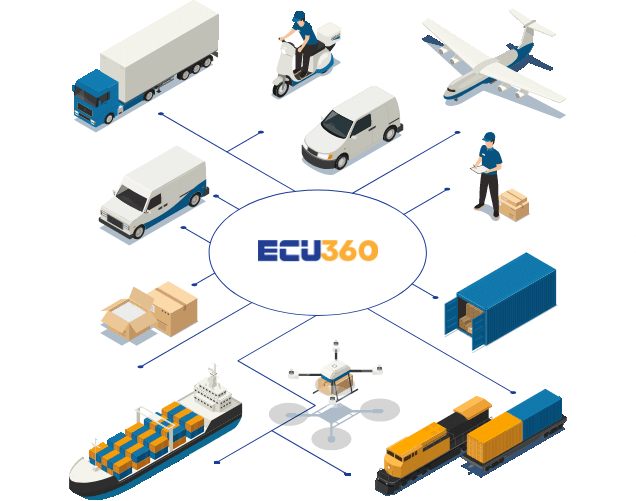How LCL Freight Shipping is a Good Option For Independent Freight?
LCL, or less than container load, is a type of ocean freight shipping that is used for shipments that are too small to fill 20- or 40-foot shipping containers. Independent freight forwarders must consider several options to reduce costs while still delivering cargo on time.
As a result, whenever the shipment is less than the minimum volume for moving via standard containers, freight forwarders must use LCL shipping options.
In other words, LCL enables transportation and logistics companies to ship more frequently while incurring lower inventory costs.
A Word or Two About LCL Shipments
To begin, it should be stated that the best mode of shipment is heavily dependent on the volume and nature of your shipment. If your cargo meets the minimum volume requirement, the charge for an FCL shipment is reduced.
However, if your cargo isn’t large enough to fill the entire container, LCL shipping is the most cost-effective option. Although you will not be able to take advantage of lower rates, LCL shipping allows you to move your freight quickly by sharing containers with other freight companies.
As a result, you only need to pay for the space occupied by your cargo in a standard 20- or 40-foot container. This simple and convenient solution enables forwarders to send a small volume of cargo via ocean freight anywhere in the world.
The container ships’ frequent departure schedule ensures the smooth and quick transit of small shipment volumes. Furthermore, using partially loaded containers is not only economical but also environmentally friendly.
Benefits of LCL Freight Shipping for Independent Freight Forwarders
LCL shipment facility benefits both freight forwarders and shippers as both can send their cargo out without having to wait for a minimum quantity (or volume). Overall LCL shipment has the following benefits for independent freight forwarders:
Cost-Effective
Cost advantage is one of the major benefits of LCL freight. Smaller shipment volumes are much more cost-effective for freight forwarding companies. LCL shipping requires forwarders to pay only for the volume of the full container that is used. When a shipment is insufficient for a full container load, forwarders can consolidate their shipments in the container and split the consignment once it arrives at the destination port.
Additionally, LCL reduces inventory management costs for small orders. This allows logistics companies to allocate their resources in other areas where they are needed.
Orders are Consistently Delivered
It enables you to send a shipment as soon as they are manufactured without incurring excessive costs. Furthermore, a small batch of LCL shipment is faster, allowing you to remain competitive. Instead of waiting for a full container load of cargo before shipping, freight companies should send small batches of shipments to ensure on-time delivery.
Furthermore, you only pay for the number of crates or pallets moved, allowing you to execute a consistent flow of deliveries. It also allows you to accept orders on the fly.
Many small and medium-sized businesses avoid mass production for financial and environmental reasons. Furthermore, many companies are reducing their stock levels to respond to the consumer’s rapidly changing needs. In this situation, it makes more sense for independent freight forwarders to ship ‘on demand.’
Increased Adaptability
Another advantage of LCL cargo shipping is that it allows forwarders to better manage their time. FCL-dependent supply chains are more difficult to optimize. You must modify your business schedule based on the volume of each container.
LCL shipments allow the shipper to move the cargo on any day of the week that is convenient for them. It enables you to respond to changes in demand, better organize your workforce, and keep your customers completely satisfied.
More Time to Concentrate on Your Business
The shipment of LCL freight allows the shipper to spend less time managing their freight. In other words, it will allow you to devote more time to your core business and close deals more quickly. It enables independent freight forwarders to save time spent tracking, tracing, and waiting before scheduling FCL shipments.
During peak season, when capacity is nearly full, sending out LCL shipments is much easier and faster. Simply put, it allows you to save time while providing tailored solutions to meet your client’s immediate needs.
Read More:[The Ultimate Guide to Less Than Container Load (LCL) Shipping: Definition, Benefits & Drawbacks]
Ship with LCL Leader
Finally, before deciding on a mode of shipment, you must weigh the pros and cons and make an informed decision. LCL is not the best option if the cargo is likely to be held up at the port due to the products of others.
So, before selecting an LCL shipment, ensure that the cargo will arrive at its destination without incident. LCL shipping offers more frequent sailings and lower costs than FCL, making it an excellent choice for shipping small cargo volumes.
ECU360 is a fully digital platform and a market leader in worldwide LCL shipment. ECU360 allows minimum effort adoption for small and big freight forwarding firms. The instant quote generation, access to advanced shipping schedules and real-time cargo tracking allow you to provide world-class service standards to your clients.
Like




Comments